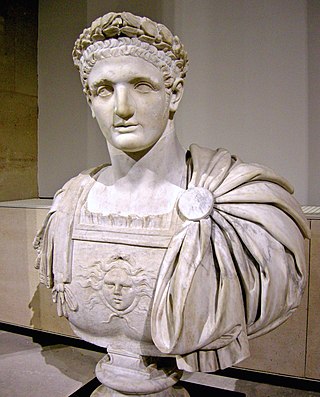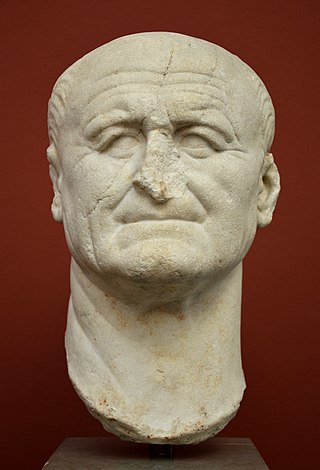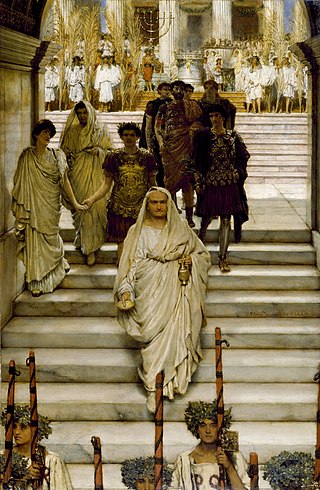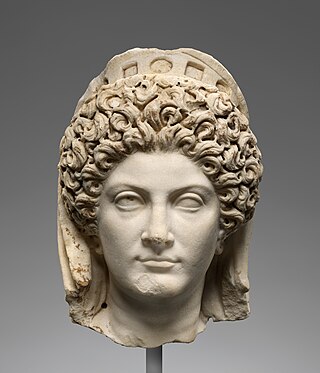Further reading
- E. Groag, A. Stein, L. Petersen – e.a. (edd.), Prosopographia Imperii Romani saeculi I, II et III, Berlin, 1933 – . (PIR2)
Titus Ollius (died AD 31) was a prominent Roman citizen and the father of Poppaea Sabina, the Empress consort of the Roman Empire. His origins lay in Cupra Maritima, a town of Picenum; an inscription found there bears his name and that of three of his freedmen. [1] Ollius was implicated in Sejanus' conspiracy against Tiberius, and committed suicide. [2]
Titus was Nero's father-in-law (#6 below).
| Ancestors of Titus Ollius | |||||||||||||||||||||||||||||||||||||||||||||||||||||||||||||||||||||||||||||||||||||||||||||||||||||||||||||||||||||||||||||||||||||||||||||||||||||||||||||||||||||||||||||||||||||||||||||||||||||||||||||||||||||||||||||||||||||||||||||||||||||||||||||||||||||||||||||||||||||||||||||||||||||||||||||||||||||||||||||||||||||||||||||||||||||||||||||||||||||||||||||||||||||||||||||||||||||||||||||||||||||||||||||||||||||||||||||||||||||||||||||||||||||||||||||||||||||||||||||||||||||||||||||||||||||||||||||||||||||||||||||||||||||||||||||
|---|---|---|---|---|---|---|---|---|---|---|---|---|---|---|---|---|---|---|---|---|---|---|---|---|---|---|---|---|---|---|---|---|---|---|---|---|---|---|---|---|---|---|---|---|---|---|---|---|---|---|---|---|---|---|---|---|---|---|---|---|---|---|---|---|---|---|---|---|---|---|---|---|---|---|---|---|---|---|---|---|---|---|---|---|---|---|---|---|---|---|---|---|---|---|---|---|---|---|---|---|---|---|---|---|---|---|---|---|---|---|---|---|---|---|---|---|---|---|---|---|---|---|---|---|---|---|---|---|---|---|---|---|---|---|---|---|---|---|---|---|---|---|---|---|---|---|---|---|---|---|---|---|---|---|---|---|---|---|---|---|---|---|---|---|---|---|---|---|---|---|---|---|---|---|---|---|---|---|---|---|---|---|---|---|---|---|---|---|---|---|---|---|---|---|---|---|---|---|---|---|---|---|---|---|---|---|---|---|---|---|---|---|---|---|---|---|---|---|---|---|---|---|---|---|---|---|---|---|---|---|---|---|---|---|---|---|---|---|---|---|---|---|---|---|---|---|---|---|---|---|---|---|---|---|---|---|---|---|---|---|---|---|---|---|---|---|---|---|---|---|---|---|---|---|---|---|---|---|---|---|---|---|---|---|---|---|---|---|---|---|---|---|---|---|---|---|---|---|---|---|---|---|---|---|---|---|---|---|---|---|---|---|---|---|---|---|---|---|---|---|---|---|---|---|---|---|---|---|---|---|---|---|---|---|---|---|---|---|---|---|---|---|---|---|---|---|---|---|---|---|---|---|---|---|---|---|---|---|---|---|---|---|---|---|---|---|---|---|---|---|---|---|---|---|---|---|---|---|---|---|---|---|---|---|---|---|---|---|---|---|---|---|---|---|---|---|---|---|---|---|---|---|---|---|---|---|---|---|---|---|---|---|---|---|---|---|---|---|---|---|---|---|---|---|---|---|---|---|---|---|---|---|---|---|---|---|---|---|---|---|---|---|---|---|---|---|---|---|---|---|---|---|---|---|---|---|---|---|---|---|---|---|---|---|---|---|---|---|---|---|---|---|---|---|---|---|---|---|---|---|---|---|---|---|---|---|---|---|---|---|---|---|---|---|---|---|---|---|---|---|---|---|---|---|---|---|---|---|---|---|---|---|---|---|---|---|---|---|---|---|---|---|---|---|---|---|---|---|---|---|---|---|---|---|---|---|---|---|---|---|---|
| |||||||||||||||||||||||||||||||||||||||||||||||||||||||||||||||||||||||||||||||||||||||||||||||||||||||||||||||||||||||||||||||||||||||||||||||||||||||||||||||||||||||||||||||||||||||||||||||||||||||||||||||||||||||||||||||||||||||||||||||||||||||||||||||||||||||||||||||||||||||||||||||||||||||||||||||||||||||||||||||||||||||||||||||||||||||||||||||||||||||||||||||||||||||||||||||||||||||||||||||||||||||||||||||||||||||||||||||||||||||||||||||||||||||||||||||||||||||||||||||||||||||||||||||||||||||||||||||||||||||||||||||||||||||||||||

Domitian was Roman emperor from 81 to 96. The son of Vespasian and the younger brother of Titus, his two predecessors on the throne, he was the last member of the Flavian dynasty. Described as "a ruthless but efficient autocrat", his authoritarian style of ruling put him at sharp odds with the Senate, whose powers he drastically curtailed.

The Epistle to Titus is one of the three pastoral epistles in the New Testament, historically attributed to Paul the Apostle. It is addressed to Saint Titus and describes the requirements and duties of presbyters/bishops.

Timothy or Timothy of Ephesus was an early Christian evangelist and the first Christian bishop of Ephesus, who tradition relates died around the year AD 97.

Vespasian was Roman emperor from 69 to 79. The last emperor to reign in the Year of the Four Emperors, he founded the Flavian dynasty, which ruled the Empire for 27 years. His fiscal reforms and consolidation of the empire brought political stability and a vast building program.

Titus Caesar Vespasianus was Roman emperor from 79 to 81. A member of the Flavian dynasty, Titus succeeded his father Vespasian upon his death, becoming the first Roman emperor to succeed his biological father.

Titus Andronicus is a tragedy by William Shakespeare, believed to have been written between 1588 and 1593. It is thought to be Shakespeare's first tragedy and is often seen as his attempt to emulate the violent and bloody revenge plays of his contemporaries, which were extremely popular with audiences throughout the 16th century.

Berenice of Cilicia, also known as Julia Berenice and sometimes spelled Bernice, was a Jewish client queen of the Roman Empire during the second half of the 1st century. Berenice was a member of the Herodian Dynasty that ruled the Roman province of Judaea between 39 BC and 92 AD. She was the daughter of King Herod Agrippa I and Cypros and a sister of King Herod Agrippa II.

The Arch of Titus is a 1st-century CE honorific arch, located on the Via Sacra, Rome, just to the south-east of the Roman Forum. It was constructed in c. 81 CE by Emperor Domitian shortly after the death of his older brother Titus to commemorate Titus's official deification or consecratio and the victory of Titus together with their father, Vespasian, over the Jewish rebellion in Judaea.

The Flavian dynasty, lasting from AD 69 to 96, was the second dynastic line of emperors to rule the Roman Empire following the Julio-Claudians, encompassing the reigns of Vespasian and his two sons, Titus and Domitian. The Flavians rose to power during the civil war of AD 69, known as the Year of the Four Emperors; after Galba and Otho died in quick succession, Vitellius became emperor in mid 69. His claim to the throne was quickly challenged by legions stationed in the eastern provinces, who declared their commander Vespasian emperor in his place. The Second Battle of Bedriacum tilted the balance decisively in favor of the Flavian forces, who entered Rome on 20 December, and the following day, the Roman Senate officially declared Vespasian emperor, thus commencing the Flavian dynasty. Although the dynasty proved to be short-lived, several significant historic, economic and military events took place during their reign.

Titus is a 1999 epic surrealist historical drama film directed and written by Julie Taymor in her directorial debut. Adapted from William Shakespeare's revenge tragedy Titus Andronicus, the movie stars Anthony Hopkins as the titular Roman general, chronicling his downfall after returning victorious from war. The film was co-produced with Jody Patton and Conchita Airoldi. The film was a co-production of the United States, the United Kingdom, and Italy; produced by Overseas Filmgroup and Clear Blue Sky Productions and released by Fox Searchlight Pictures.

Julia Flavia or Flavia Julia, nicknamed Julia Titi, was the daughter of Roman Emperor Titus and his first wife Arrecina Tertulla.
Berenice is a five-act tragedy by the French 17th-century playwright Jean Racine. Berenice was not played often between the 17th and the 20th centuries.

Titus Aurelius Fulvus was a Roman senator, who was active during the reign of Domitian. Fulvus is best known as the father of Roman Emperor Antoninus Pius. His father, also named Titus Aurelius Fulvus, had also been twice consul and promoted to the patrician class.

De vita Caesarum, commonly known as The Twelve Caesars, is a set of twelve biographies of Julius Caesar and the first 11 emperors of the Roman Empire written by Gaius Suetonius Tranquillus. The group are: Julius Caesar, Augustus, Tiberius, Caligula, Claudius, Nero, Galba, Otho, Vitellius, Vespasian, Titus, Domitian.

Titus Manlius Imperiosus Torquatus was a famous politician and general of the Roman Republic, of the old gens Manlia. He had an outstanding career, being consul three times, in 347, 344, and 340 BC, and dictator three times, in 353, 349, and 320 BC. He was one of the early heroes of the Republic, alongside Cincinnatus, Cornelius Cossus, Furius Camillus, and Valerius Corvus. As a young military tribune, he defeated a huge Gaul in one of the most famous duels of the Republic, which earned him the epithet Torquatus after the torc he took from the Gaul's body. He was also known for his moral virtues, and his severity became famous after he had his own son executed for disobeying orders in a battle. His life was seen as a model for his descendants, who tried to emulate his heroic deeds, even centuries after his death.

Marcia Furnilla was a Roman noblewoman who lived in the 1st century. Furnilla was the second and last wife of the future Roman Emperor Titus as well as the aunt of the future emperor Trajan.

Titus Andronicus is the main character in William Shakespeare's revenge tragedy of the same name, Titus Andronicus. Titus is introduced as a Roman nobleman and revered general. Prior to the events of the play, he dedicated ten years of service in the war against the Goths, losing 21 sons in the conflict. In the opening act, Titus orders that the eldest son of Tamora, Queen of the Goths, be sacrificed according to Roman tradition in order to avenge his dead kin. He is also offered the emperorship, but he declines the honor and bestows it upon the late emperor's son, Saturninus. When Saturninus is denied the ability to pick his first choice of empress, Lavinia, he chooses to wed Tamora. Throughout the rest of the play, Titus and Tamora remain locked in a battle of brutal revenge. The play thus descends into moral chaos as characters perpetrate or find themselves victims of various egregious offenses, including rape, mutilation, and murder.
The gens Ollia was a minor plebeian family at Rome. Few members of this gens achieved any prominence, and the best-known may have been Titus Ollius, the father of the empress Poppaea Sabina. Other Ollii are known from inscriptions.
Poppaea Sabina the Elder was an aristocratic woman who lived during the Principate. During her lifetime she was famed for her beauty, but as Ronald Syme writes, her "fame and follies have been all but extinguished by her homonymous daughter", Poppaea Sabina the Younger. She met her end as a victim of the empress Valeria Messalina, wife of Claudius.
The gens Milonia was an obscure plebeian family at ancient Rome. The first member of this gens mentioned in history was Gaius Milonius, a Roman senator, and one of Cinna's allies. The empress Milonia Caesonia was presumably descended from this family. A few Milonii are known from inscriptions.